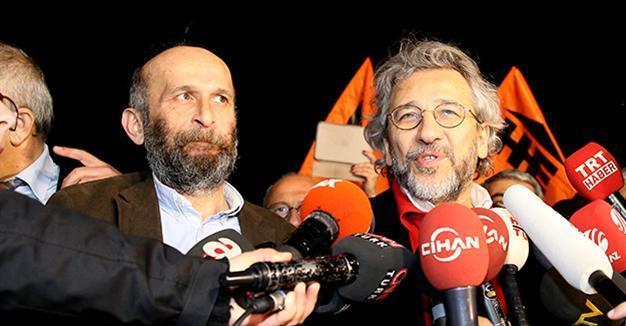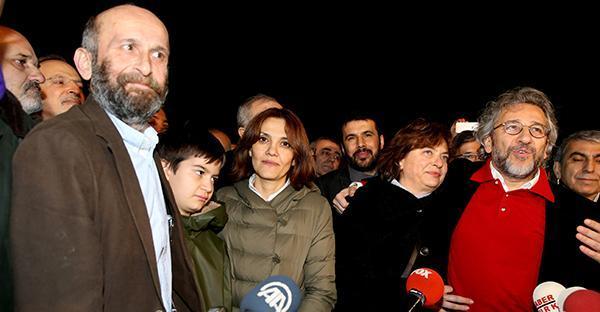Arrested Turkish journalists released after 92 days in prison
ISTANBUL

AA Photo
Cumhuriyet Editor-in-Chief Can Dündar and the daily’s Ankara bureau chief, Erdem Gül, were released early on Feb. 26 following 92 days in prison on terrorism charges, hours after the country’s top court’s ruled their arrest had violated their rights.
Turkey’s Constitutional Court ruled on Feb. 25 that the fundamental rights of Dündar and Gül had been violated. Following the decision, Istanbul 14th Court of Serious Crimes ordered their release but subjected them to an overseas travel ban.
Dündar and Gül were met by a group of supporters, including their family and two Republican People’s Party (CHP) deputies, when they left Silivri Prison near Istanbul at 3:15 a.m.
“Sorry for keeping you waiting this long,” Dündar told reporters waiting outside the prison. “You know, the 26th is President [Recep Tayyip] Erdoğan’s birthday. We are happy to celebrate his birthday with this release decision.”
Recalling that he was arrested on his wedding anniversary, Dündar said, “We wanted to give [President Erdoğan] a birthday present.”
Dündar praised the Constitutional Court’s decision, saying it was “historic” in terms of the state of freedom of expression in Turkey.
“The Constitutional Court’s ruling today opened the way, not just for us, but for all our colleagues in terms of press freedoms and freedom of expression,” he said.
“We do not hold a grudge, we are not angry, but we are very determined to fight. We will continue to defend ourselves and our voices will be louder,” he said.
Dündar added that the price they paid, three months of imprisonment, was nothing compared to what some other Turkish journalists went through and provided the example of the assassinated editor-in-chief of daily Milliyet, Abdi İpekçi.
In his speech, Dündar also expressed appreciation to their supporters, especially members of the press who volunteered to keep watch in front of Silivri Prison as part of a protest called “Hope Watch.”
“First of all, we would like to thank our hope watchers for giving us hope from that tiny tent,” he said. “We witnessed that a tiny tent can bring a giant palace to its knees,” Dündar added, referring to the controversial presidential palace in Ankara.
Dündar underlined that their case, which is of importance to press freedoms in Turkey, is set to continue.
“We are out but over 30 of our colleagues are inside. I hope this decision will clear the way for them as well,” he said, pledging to follow their cases in the name of freedom of expression.
Dündar also touched upon their story on Turkish intelligence trucks bound for Syria in early 2014, saying they wanted to warn against the dangers that had become clearer over time.
“I wish that story had not been swept under the carpet at the time and that Turkey could have avoided the quagmire [in Syria],” he said, arguing that recent remarks by Prime Minister Ahmet Davutoğlu and President Erdoğan on al-Nusra in Syria constituted “confessions.”
“[The confessions] were in fact proof of our story,” he said, adding they believed they did the right thing and would continue to do what they believe to be right.
Gül also made a brief statement to reporters, arguing that the Constitutional Court deserved a “thank you,” while noting that there was a need to overcome the barriers obstructing freedoms.
Gül also expressed regret that the local court did not reach a similar verdict earlier instead of issuing an arrest decision.
“We have been released but this does not mean that the issue of arrested journalists is over,” he said. “We have friends behind bars and our battle needs to continue for them. From now on, this unity should continue in the face of pressures against the press.”

Turkish political parties also welcomed the court decision starting with a statement from main opposition CHP leader Kemal Kılıçdaroğlu. Kılıçdaroğlu posted a tweet from his official Twitter account, saying the decision meant that “telling the truth is not a crime.”
“I hope for freedom for Can Dündar, Erdem Gül and all journalists,” Kılıçdaroğlu said.
Similarly, CHP group deputy chairman Levent Gök said they “welcomed” the decision with regards to the “unjust arrest that implicitly hindered freedom of information” and the freedom to make news.
Ruling Justice and Development Party (AKP) group deputy chairman Bülent Turan also expressed his “happiness” over the Constitutional Court’s ruling while adding that it was not right to accuse the AKP of interference in legal proceedings.
“We will consider the local court’s decision as lawful, just like the Constitutional Court’s ruling,” he said, underlining the essentiality of trial without arrest.
The group deputy chairman of the Nationalist Movement Party (MHP), Erkan Akçay, said no one could reveal a secret that was already known by all, referring to the intelligence trucks story that lies at the heart of Dündar and Gül’s case.
“We need to form a structure supporting objectivity, honesty and truthfulness,” he said, in addition to the right to information.
Peoples’ Democratic Party (HDP) group deputy chairman İdris Baluken said the “unjust arrest and isolation” of Dündar and Gül had hurt the conscience of world public opinion.
U.K. Ambassador to Ankara has also praised the court ruling and the release of Dündar and Gül.
“I welcome the Constitutional Court’s ruling of yesterday, ending 3 months pre-trial detention for Can Dundar and Erdem Gul,” Richard Moore said in a tweet.
“Freedom of press and expression is a fundamental right forming the cornerstone of any functioning democracy,” he added.
Meanwhile, Council of Europe Secretary General Thorbjorn Jagland has also welcomed the top court's decision in the case.
“I was glad to hear the judgment of the Turkish Constitutional Court today which found that the rights of Cumhuriyet newspaper’s editor-in-chief, Can Dündar, and its Ankara bureau chief, Erdem Gül, had been violated. I welcome their release. The judgment demonstrates the importance of an independent Constitutional Court in Turkey which bases its decisions on the European Convention on Human Rights,” Jagland said.
Decision not an acquittal: Presidency spokespersonOn the other hand, Presidential spokesperson İbrahim Kalın was cautious in commenting on the decision and compared the case of Dündar and Gül with the cases of Julian Assange, Chelsea Manning and Edward Snowden.
Drawing parallels between the cases by arguing that all are cases of “espionage,” Kalın said it was “unacceptable” to evaluate the legal proceedings differently in Turkey and in Western countries.
Kalın said the United States had brought cases against these individuals and that they would receive major punishments in the event they were apprehended and tried.
“The case is ongoing; this is a discharge decision, not an acquittal,” he added. “We will follow the legal proceedings closely.”
Press associations express hope after court decisionTurkey’s Press Council, which organized the “Hope Watch,” also released an official statement, defining the Constitutional Court ruling a “historic turning point” which will establish a precedent.
“Arresting journalists for journalistic activity is a shame on democracies,” the council said, adding that the decision “enlivened hopes” in the Turkish judiciary.
“While we welcome the decision to free Can Dündar and Erdem Gül, we hope no other members of the press are victimized for their journalistic activities, warning against [such actions],” it said.
Turkish Journalists Association (TGC) also issued a statement on Dündar and Gül’s release, defining the decision as one that “lifts the heavy pressure” imposed upon journalists.
Defining the ruling as “historic,” TGC said the decision would help strengthen Turkey’s democracy.
“The Constitutional Court applied the criteria of the European Convention of Human Rights. This is hopeful for our 30 arrested or convicted colleagues,” it said. “This is a step to reverse the state of emergency being imposed upon press freedoms and freedom of expression in Turkey over the past 10 years.”
“We want the Constitutional Court decision to serve as a persistent reminder to politicians that journalistic activities serve people’s right to information and cannot be linked to espionage or terrorism,” it said.
The journalists made personal applications to the top court to demand their release on Dec. 6, 2015, on the grounds that their pre-trial arrests were against the constitution. They also said in their application that their lawyers had so far been unable to examine their files due to a lower court’s “limitation” decision.
Dündar and Gül were accused of espionage threatening state security and supporting an armed terrorist organization due to stories published in Cumhuriyet about Turkish National Intelligence Agency (MİT) trucks that were allegedly bringing weapons to unknown groups in Syria.
The duo was arrested by an Istanbul court on Nov. 26 last year, triggering reactions from press organizations, NGOs and many Western countries.
The indictment, which was completed on Jan. 27, carries the penalty of life in prison, penal servitude for life and 30 years in prison for both Dündar and Gül.

